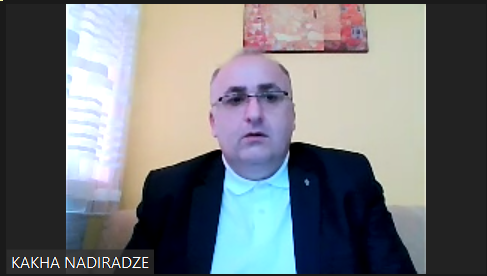June 24, 2022 – Dr. Kakha Nadiradze President of the Association for Farmers Rights Defense (AFRD) in Georgia, convened virtually on behalf of the World Farmers’ Organisation at the regional dialogue on the United Nations Decade of Family Farming (UNDFF) implementation in Europe and Central Asia.
The event is part of a series of preparatory regional meetings organised to collect insights for the 1st Global Forum of the UNDFF that will take place next September.
It took place in Budapest in a hybrid version, to allow wider participation and contribution of all relevant stakeholders.
The aim of that Regional Dialogue on the UNDFF in Europe and Central Asia was to address emerging topics, identify the way forward and strengthen multi-actor collaboration including government, parliamentarians, family farmers and their organizations, researchers, NGOs and technical experts.
The goal was to provide a discussion space and visibility to themes that are embedded in the 7 Pillars of the Global Action Plan of the UNDFF.
The Global Action Plan was developed in 2019 to support the implementation of the UNDFF through an extensive global consultation process, which stresses the importance of creating an enabling policy environment to strengthen family farming and recommends the implementation of country-driven, inclusive, participative and bottom-up activities to support family farmers.
As a member of the UNDFF International Steering Committee, WFO is actively engaged in implementing the Family Farming Decade.
WFO is a member of the UN Decade of Family Farming 2019-2028, International Steering Committee that was created to oversee the implementation of the Decade, working hand in hand with FAO and IFAD, as well as other global and regional Farmers’ Organisations, to support the implementation of the UNDFF Global Action Plan.
WFO is in constant contact with its members to get information on challenges and opportunities regarding the UNDFF implementation at the local, national and regional levels.
Two points are particularly relevant to WFO, women and youth empowerment as cross-cutting issues and preconditions to strengthen family farming and implement the Decade goals, as well as achieve more resilient, inclusive and sustainable food systems.

Priorities and specific needs of Europe and Central Asia area to support Family Farming and contribute to the achievement of the 2030 Agenda for Sustainable Development
Dr. Nadiradze joined Session 3 – Technical discussions: “priorities for the region and the way forward” that focused on priorities in support of family farming, related policies and key recommendations for scaling up the implementation of the UNDFF.
He explained to the audience the main bottlenecks Family Farmers are facing nowadays globally in the ECA region and locally in Georgia underlying that “Problems are similar in every country but solutions need to be tailored”.
“Small scale farmers need specific policies to facilitate their access to market and resources (i.e. water and sanitation)” – he stated – “Moreover, traditional knowledge and experience need to be capitalised and youth and women need to be empowered”.
Dr. Nadiradze also remarked on the urge for national and international reforms to make Family Farmers more competitive and the need to “remove barriers that prevent access to new technologies that can help them minimise losses and increase competitiveness “.
Closing his speech, he invited the audience to keep in mind that “farmers contribute actively to local food security, sustainability, resilience, and their quality-of-life matters”.
